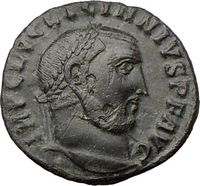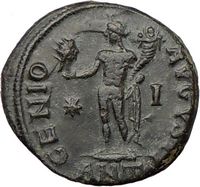Licinius I Roman Emperor 308-324AD Biography Buy Certified Authentic
Ancient Coins Investment
Buy certified ancient coins with
Licinius I Roman Emperor
Get incredible value with a LIFETIME GUARANTEE
of AUTHENTICITY.


Example of Authentic Ancient
Coin of:
Licinius I - Roman Emperor: 308-324 A.D. -
Bronze Follis Antioch mint 312 A.D.
IMPCLICLICINNIVSPFAVG - Laureate head right.
GENIOAVGVSTI Exe: */I/ANT - Genius standing
left, holding head of Sol and cornucopia.
GENIUS. The name comes probably from Lat. gignere, because
this deity was assigned to each human when he was conceived or he was
taken under his protection (Varro), or he has created us himself or has
been created together with us (Apuleius).
It's clear, that the Romans tried to integrate the Genius into their
mythology. His parents should have been Jupiter and Gaea, who has born
him, after Jupiter has created him when he was asleep. Others suggest
that he was a son of the gods and the father of men. In any case all
suggest that the Genii - there are many of them! - take a middle
position between the gods and men. As soon as a human being was born one
or two Genii were assigned to him, a white good one and a black bad one.
The good one gives him all of his good thoughts, the bad one the
contrary. Which ever is the stronger one he is the one who forms the
character of the man. Genii always appear at males. Within women there
were the Junones. The Genii stayed with their person until his death
when they gave him to the gods. According to others each man has only
one Genius. The Genius handed down his man to the court and blamed him
if he was lying or praised him when he kept the truth. According to the
Genius the judgement was given to him because the Genius knew all of his
secret thoughts. Even families, cities and countries had these guardian
spirits. The Genius of Rome had a golden statue in the VIII regio.
Everyone gave honour to his own Genius, especially at his birthday when
he gave offerings to him but only flowers, wine and incense, because it
was not allowed to kill any animal on this day. A vow done by the Genius
of the emperor was the most steadfast oath as if it was done by Jupiter
himself. Some suggested that the Genius was identical with the Animus,
others that he actually was the mind of men. But because also mountains,
swamps, lakes, fountains, valleys and forests had their own Genius it
could be concluded that he actually was a fictive entity invented only
to put the humans in fear and to prevent them from vice (Hederich).
Licinianus Licinius (c. 263 - 325) was
Roman emperor from 308 to 324.
Of
Dacian (Thracian)
peasant origin, born in
Moesia Superior, Licinius
accompanied his close childhood friend, the Emperor
Galerius, on the Persian expedition in
297. After the death of
Flavius Valerius Severus, Galerius
elevated Licinius to the rank of
Augustus in the West on November 11,
308. He received as his immediate command the provinces of
Illyricum,
Thrace and
Pannonia.
On the death of Galerius, in May 311, Licinius shared
the eastern empire with
Maximinus Daia, the
Hellespont and the
Bosporus being the dividing line.
In March 313 he married
Flavia Julia Constantia, half-sister of
Constantine, at Mediolanum (now
Milan); they had a son,
Licinius the Younger, in 315. Their
marriage was the occasion for the jointly-issued "Edict
of Milan" that restored confiscated properties to Christian
congregations and allowed
Christianity to be professed in the
empire.
In the following month, on April 30, Licinius
inflicted a decisive defeat on Maximinus at the
Battle of Tzirallum, after Maximinus
had tried attacking him. Then, Licinius established himself master of
the East, while his brother-in-law, Constantine, was supreme in the
West.
In 314, a civil war erupted between Licinius and
Constantine, in which Constantine prevailed at the
Battle of Cibalae in
Pannonia (October 8, 314) and again two
years later, when Licinius named
Valerius Valens co-emperor, in the
plain of
Mardia (also known as
Campus Ardiensis) in
Thrace. The emperors were reconciled
after these two battles and Licinius had his co-emperor Valens killed.
Licinius' fleet of 350 ships was defeated by
Constantine I's fleet in 323. In 324, Constantine, tempted by the
"advanced age and unpopular vices" of his colleague, again declared war
against him, and, having defeated his army of 170,000 men at the
Battle of Adrianople (July 3, 324),
succeeded in shutting him up within the walls of
Byzantium. The defeat of the superior
fleet of Licinius in the
Battle of the Hellespont by
Crispus, Constantine’s eldest son and
Caesar, compelled his withdrawal to
Bithynia, where a last stand was made;
the
Battle of Chrysopolis, near
Chalcedon (September 18), resulted in
Licinius' final submission. While Licinius' co-emperor
Sextus Martinianus was killed, Licinius
himself was spared due to the pleas of his wife, Constantine's sister,
and interned at
Thessalonica. The next year,
Constantine had him killed, accusing him of conspiring to raise troops
among the barbarians.
Serbian
tradition
For unknown reasons, Licinius was traditionally for
centuries throughout the entire
Serbian historiography considered as a
Serb and as a forefather of the
House of Nemanjić. This only changed
with historical accounts of
Slavic migrations by 19th century
historians.
|